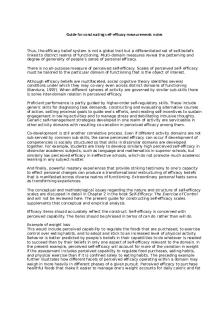Likert Scale PDF

| Title | Likert Scale |
|---|---|
| Author | Des Cleveland |
| Course | Adolescent Psychology and Psychopathology |
| Institution | Arizona State University |
| Pages | 2 |
| File Size | 82.1 KB |
| File Type | |
| Total Downloads | 23 |
| Total Views | 141 |
Summary
Likert Scale...
Description
The Dogmatism Scale Please do not skip any of the statements, and answer each statement to the best of your ability.
Strongly Agree, Agree, Sometimes, Disagree, Strongly Disagree
1. Once an idea is in my head, I stick with it. Strongly Disagree 2. My own personal beliefs seem to be more right than others. Agree 3. I am open to hear others opinions and let them at least try to change my mind. Sometimes 4. I would rather agree with someone, even though I know they are wrong, just because we share a similar opinion. Sometimes 5. Nobody should have beliefs or opinions so strong that they are not willing to change them. Disagree 6.
I consider someone to be ignorant when they do not share my opinion or belief. Sometimes
7. My outlook on life is based on my personal opinions and beliefs. Agree 8. I believe what evidence backs up, no matter what I believed previously. Agree 9. Even with evidence against my belief or opinion, I still do not change my mind. Disagree 10. There is no complete set of beliefs that satisfy my way of life. Strongly Agree 11. I am willing to hear both sides before setting my opinion. Sometimes 12. When my friends say something is true, and it is against my beliefs, I will change my mind to agree with them. Strongly Disagree 13. In a debate, I do not bother to consider the validity of the other side. Disagree 14. I accept that many or at least some of my beliefs and/or opinions may be wrong. Agree 15. I am constantly changing my opinions or beliefs. Sometimes 16. I often disassociate from people who disagree with me. Sometimes 17. I feel I am flexible towards the beliefs or opinions of everyone else. Sometimes 18. Eventually, my beliefs and opinions will become outdated and I will change them. Agree 19. My beliefs and opinions will never be changed. Disagree
20. When someone asks me a question, I tell them my opinion, not what is necessarily true. Sometimes -
http://www.simplypsychology.pwp.blueyonder.co.uk/
Scoring Items: 1, 2, 6, 7, 9, 10, 13, 16, 19, 20 ● ● ● ● ●
Strongly Agree = 5 Agree = 4 Sometimes = 3 Disagree = 2 Strongly Disagree = 1 ○ 29
Items: 3, 4, 5, 8, 11, 12, 14, 15, 17, 18 ● Strongly Agree = 1 ● Agree = 2 ● Sometimes = 3 ● Disagree = 4 ● Strongly Disagree = 5 ○ 34
The higher the score (maximum 100) on the scale the more dogmatic (i.e. close-minded) the person is, and the more their beliefs are “set in stone”. As people get older they usually become more dogmatic (set in their ways). Also, people who are dogmatic tend to hold more prejudiced views about different social groups.
a. Outline what is meant by the term Likert Scale -
Likert Scale describes a psychometric response measurement tool that specificities responders level of agreement to a statement. This is usually done on a five-point system: Strongly disagree; disagree; sometimes; agree; strongly agree.
b. List the advantages and disadvantages of using a Likert scale to measure a person’s attitude. -
Advantages include being able to gauge one’s general perception, they are easily understandable by both responders and data collectors/professionals, and findings are easily quantifiable. As for disadvantages, Likert scales leave room for dishonesty; for instance, people tend to avoid choosing the “extreme” options, strongly agree and/or strongly disagree, because there are negative implications associated with “extremists”. Beyond dishonesty, the scale also fails to capture responders true attitudes due to its uni-dimensional nature. -
http://www.simplypsychology.pwp.blueyonder.co.uk/...
Similar Free PDFs

Likert Scale
- 2 Pages

Likert Scale Examples
- 2 Pages

Scala Likert
- 7 Pages

Skala likert
- 13 Pages

Psicologia social escala likert
- 9 Pages

blue print likert
- 3 Pages

Scale vineland
- 1 Pages

Time scale
- 4 Pages

Ejemplo de Escala de Likert
- 2 Pages

RIASSUNTO SCALE
- 2 Pages

GRIT scale
- 3 Pages

BMIS Scale
- 1 Pages

Scale construction
- 5 Pages
Popular Institutions
- Tinajero National High School - Annex
- Politeknik Caltex Riau
- Yokohama City University
- SGT University
- University of Al-Qadisiyah
- Divine Word College of Vigan
- Techniek College Rotterdam
- Universidade de Santiago
- Universiti Teknologi MARA Cawangan Johor Kampus Pasir Gudang
- Poltekkes Kemenkes Yogyakarta
- Baguio City National High School
- Colegio san marcos
- preparatoria uno
- Centro de Bachillerato Tecnológico Industrial y de Servicios No. 107
- Dalian Maritime University
- Quang Trung Secondary School
- Colegio Tecnológico en Informática
- Corporación Regional de Educación Superior
- Grupo CEDVA
- Dar Al Uloom University
- Centro de Estudios Preuniversitarios de la Universidad Nacional de Ingeniería
- 上智大学
- Aakash International School, Nuna Majara
- San Felipe Neri Catholic School
- Kang Chiao International School - New Taipei City
- Misamis Occidental National High School
- Institución Educativa Escuela Normal Juan Ladrilleros
- Kolehiyo ng Pantukan
- Batanes State College
- Instituto Continental
- Sekolah Menengah Kejuruan Kesehatan Kaltara (Tarakan)
- Colegio de La Inmaculada Concepcion - Cebu


